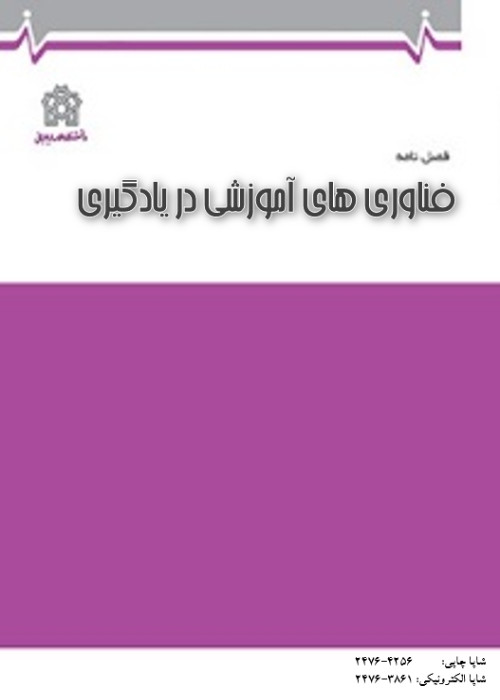Investigating the Role of E-Learning Skills on the Virtual Student's Academic Achievement and Satisfaction
Author(s):
Abstract:
This study aims to investigate the role of e-learning skills in the virtual students’ academic achievement and satisfaction. The statistical population is composed of all students at the E-Learning Education Center at the University of Tehran and Mehr Alborz Higher Education Institute out of whom, 388 individuals were selected as the sample using the relative stratified sampling method and based on Kerjessi and Moregan Table. The research method is correlation, and two researcher-developed questionnaires, e-learning preparation measurement test, and academic satisfaction test were used for data collection. Content validity of these two tests through using the views of seven e-learning specialists and their reliability upon trial administration to 60 students and calculation of Cronbach’s alpha were put at 0.84 and 0.87 respectively. Moreover, in order to measure and assess academic achievement, the researchers employed the students’ mean of academic achievement. The research data were analyzed by means of a t-test, Pearson correlation coefficient and stepwise regression, the results of which indicated that the level of students’ skills is mediocre, level of academic satisfaction is mediocre, and the level of their academic achievement is good. Pearson correlation coefficient demonstrated that there is a correlation between metacognitive and cognitive skills and academic achievement. Furthermore, the results and findings suggest that there is a correlation between metacognitive and cognitive skills and academic satisfaction, while no significant relation was found between the variables of technological skills and communication skills and academic achievement and satisfaction. The share of metacognitive skills in prediction of the students’ academic achievement is 32.8%, and that of cognitive skills is 11.5%. In addition, the share of metacognitive skills in prediction of students’ academic satisfaction is 50%, and that of cognitive skills is 17.5%.
Keywords:
Language:
Persian
Published:
Journal of Technology of Instruction and Learning, Volume:1 Issue: 2, 2015
Page:
57
magiran.com/p1420237
دانلود و مطالعه متن این مقاله با یکی از روشهای زیر امکان پذیر است:
اشتراک شخصی
با عضویت و پرداخت آنلاین حق اشتراک یکساله به مبلغ 1,390,000ريال میتوانید 70 عنوان مطلب دانلود کنید!
اشتراک سازمانی
به کتابخانه دانشگاه یا محل کار خود پیشنهاد کنید تا اشتراک سازمانی این پایگاه را برای دسترسی نامحدود همه کاربران به متن مطالب تهیه نمایند!
توجه!
- حق عضویت دریافتی صرف حمایت از نشریات عضو و نگهداری، تکمیل و توسعه مگیران میشود.
- پرداخت حق اشتراک و دانلود مقالات اجازه بازنشر آن در سایر رسانههای چاپی و دیجیتال را به کاربر نمیدهد.
In order to view content subscription is required
Personal subscription
Subscribe magiran.com for 70 € euros via PayPal and download 70 articles during a year.
Organization subscription
Please contact us to subscribe your university or library for unlimited access!



